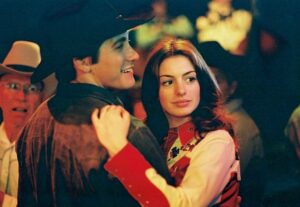
Two sheep herders on a secluded mountainside make discoveries about themselves, and their sexualities, and just deal with the discriminatory repercussions of society, in Brokeback Mountain.
It’s hard to believe that only a few years ago, we were still so rooted in anger and discrimination that a movie like Brokeback Mountain was considered groundbreaking, shocking, and rather upsetting. That’s why Pride month is so important. It brings attention to the fact that LGBTQ people exist and walk amongst us daily, and it makes things like Brokeback Mountain a whole lot less “shocking.” Because by focusing on that, and the ensuing controversy, we missed out on the truly moving and fantastic film underneath, which managed to be a great, tragic love story while also shining a light upon the troubling behavior that led to so many gays being forced into hiding, and illustrated perfectly how much hate can hurt innocent people.
Ang Lee is a mainstay when it comes to wonderful directors. He’s made an impact for years through his projects, especially those that raise awareness of important issues, and Brokeback Mountain is no different. Using a tender and intimate lens to portray the tumultuous relationship between two men who fight against their nature in order to fit into societal expectations, he masterfully tells their story with a quiet beauty that’s hard to find in any love story, let alone one with a central focus on gay men. Based on a short story originally written by Annie Proulx, which is admittedly far too short and rushed for my preference, the film expands upon the source material in all the right ways, and if you’re not in tears by the ending, you officially have no soul.

Featuring Heath Ledger in one of the highlights of his career before his unfortunate death at way too young of an age, it’s easy to see why he was such a lauded actor in his short time in the limelight. Portraying the gruff and resistant Ennis, his internal conflict is worn on his face with finesse and authenticity, and his performance is perfectly balanced by Jake Gyllenhaal’s Jack, who manages to be slightly more carefree and spirited even in the face of adversity and hate. The chemistry between these two is steamy and, even more importantly, loving. You truly believe they’re in love but unable to be together. Forced to live “presentable” lives by marrying wives, played by Michelle Williams and Anne Hathaway respectively in roles that help to amplify the pain of the leads, you ache for Ennis and Jack, longing for them to find a safe place to be together in a world that wants nothing more than to oppress them for doing something so simple as loving one another.
Brought together with incredible cinematography and a subtle score, every facet of Brokeback Mountain is pretty close to perfect. It’s beautiful in every way you could want from a grand and sweeping love story, and it deserves high praise and attention even 20 years on. My only complaint is the fact that it’s not quite as representative of the groups it’s depicting behind the camera as I would hope, but it also helped to lead the charge of bringing attention to LGBTQ people in media, and for that, I’ll always be grateful.
Brokeback Mountain wasn’t the first movie to highlight the LGBTQ movie, but it was one of the biggest pivotal moments in the mainstream acceptance of these films. The Oscars it won were well deserved, but the fact it didn’t win Best Picture is a tragedy that almost rivals the film itself. I would be hard pressed to find another love story that hurts quite as much as this one. Love is, and has always been, love.



